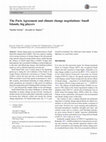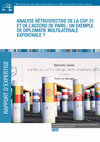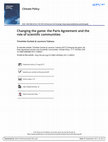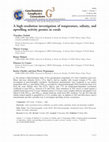Papers by Timothée Ourbak

Climate change poses an existential threat to Small Island Developing States (SIDS). They have pl... more Climate change poses an existential threat to Small Island Developing States (SIDS). They have played a leading role in raising awareness of climate change on the international stage and advocating for strong climate action, notably through the Alliance of Small Island States (AOSIS). Despite their heterogeneity, they succeeded in building a common diplomatic discourse and influencing strategy, and mobilized political leaders as well as talented negotiators and advisors. Small Island States were a crucial group in the negotiating period up to, during the 21st Conference of the Parties to the United Nations Framework Convention on Climate Change (COP21), and for the entry into force of the Paris Agreement. SIDS succeeded to secure their special circumstances as vulnerable countries, demonstrated leadership in raising ambition to reduce greenhouse gas emissions to help secure an ambitious long-term temperature goal of limiting global warming to below 1.5 °C, and advanced the complex debate on loss and damage. Small Island States face major challenges to advance their leadership on climate change moving forward: securing immediate actions for those particularly vulnerable countries and increasing their influence within and outside the climate change negotiations. For Small Island states, the 1.5 °C goal should be considered " the visible part of the iceberg " for their diplomacy in a post-Paris context.

Adopté le 12 décembre 2015 lors de la COP21 et entré en vigueur le 4 novembre 2016 – moins d’un a... more Adopté le 12 décembre 2015 lors de la COP21 et entré en vigueur le 4 novembre 2016 – moins d’un an après son adoption, ce qui est inédit au plan international – l’accord de Paris a permis de restaurer la confiance en la convention climat, vue désormais comme un forum dynamique du multilatéralisme après avoir longtemps été critiquée pour la lenteur de ses négociations.
Le 21e siècle aurait-il débuté le 12 décembre 2015 ? Comment la diplomatie française a-t-elle réussi le premier pacte universel sur le climat, le « plus important accord international du 21e siècle », là où d’autres avant avaient échoué ?
Cette étude propose le point de vue du négociateur et revient sur la formation d’une équipe tendant au succès et sur l’articulation du technique et du politique avant d’examiner la préparation de la COP21 et son déroulement.
L’équipe en « mode commando », en « mode gestion de crise », a su inspirer la confiance des acteurs des négociations en se fondant sur des principes de transparence, d’écoute et d’« inclusivité ».
Cette étude se focalise ensuite sur le processus de négociation en montrant comment l’équipe de négociations, que l’on a appelée « l’équipe de France du climat », a élaboré une stratégie résidant sur la poursuite d’un équilibre ambitieux et sur des concessions de la part de tous, plutôt qu’un accord sur le plus petit dénominateur commun.

Scientific communities were instrumental in building the momentum that led to the success of the ... more Scientific communities were instrumental in building the momentum that led to the success of the Twenty-first Conference of the Parties to the United Nations Framework Convention on Climate Change (COP21), held in Paris in December 2015. Less than a year after its adoption, the Paris Agreement has entered into force. The Paris Agreement is now, and will stay, a reality. Now more than ever, with an unprecedented mobilization all over the world to implement and enhance climate actions, advances in science are needed to inform the negotiations and guide political choices to raise climate ambition. This article proposes several areas where scientific communities could help to implement the Paris Agreement and promote low carbon, climate-resilient economies and societies. In doing so, it focuses on the role of science in several key areas. Firstly, the article explores the relationship between the Intergovernmental Panel on Climate Change (IPCC) and the new climate regime, with a focus on the 1.58C special report and future global stocktakes. The article then considers how science can contribute to the preparation of long-term low greenhouse gas (GHG) emission development strategies, before focusing on the role of science in advancing on adaptation issues. Now more than ever, scientific advances and inputs are needed to strengthen the upward revision of ambition, and inform sound concrete actions. Policy relevance The climate change negotiations have always been informed by science; the adoption of the Paris Agreement in 2015 benefitted from the fifth assessment report of the IPCC released a few months before COP21. The new era of global climate policy after the entry into force of the Paris Agreement will require stronger interactions between scientists and policy makers. This 'perspectives' article proposes, from the point of view of the former French Presidency of COP21, areas where links and interactions could be strengthened to help implement the Paris Agreement, and to place science at the centre of the transformation towards low emission and resilient societies.

Geochemistry, …, Jan 1, 2006
1] We present a high-resolution study of five geochemical components of a New Caledonia coral cor... more 1] We present a high-resolution study of five geochemical components of a New Caledonia coral core. Minor and trace elements (Sr/Ca, U/Ca, Mg/Ca, Ba/Ca), together with oxygen isotopes (d 18 O), were investigated at near-fortnightly resolution. Geochemical measurements were compared to sea surface temperature (SST TSG ) and salinity (SSS TSG ) recorded by a thermosalinograph (TSG) located less than 10 m from the coral. Results show that Sr/Ca, Mg/Ca, and d 18 O are temperature-dependent (correlation coefficient to local SST TSG between 0.74 and 0.84). Their robustness as SST tracers is tested against a satellite-based data set for a 4 year validation period. U/Ca has a more complex behavior and appears to be linked to both SST TSG and SSS TSG , despite relatively small local SSS variations. For the first time this salinity-related imprint is quantified in a U/Ca coralline ratio. In addition to SST and SSS tracers, Ba/Ca measurements provide a possible way to investigate upwelling activity occurrences.
Uploads
Papers by Timothée Ourbak
Le 21e siècle aurait-il débuté le 12 décembre 2015 ? Comment la diplomatie française a-t-elle réussi le premier pacte universel sur le climat, le « plus important accord international du 21e siècle », là où d’autres avant avaient échoué ?
Cette étude propose le point de vue du négociateur et revient sur la formation d’une équipe tendant au succès et sur l’articulation du technique et du politique avant d’examiner la préparation de la COP21 et son déroulement.
L’équipe en « mode commando », en « mode gestion de crise », a su inspirer la confiance des acteurs des négociations en se fondant sur des principes de transparence, d’écoute et d’« inclusivité ».
Cette étude se focalise ensuite sur le processus de négociation en montrant comment l’équipe de négociations, que l’on a appelée « l’équipe de France du climat », a élaboré une stratégie résidant sur la poursuite d’un équilibre ambitieux et sur des concessions de la part de tous, plutôt qu’un accord sur le plus petit dénominateur commun.
Le 21e siècle aurait-il débuté le 12 décembre 2015 ? Comment la diplomatie française a-t-elle réussi le premier pacte universel sur le climat, le « plus important accord international du 21e siècle », là où d’autres avant avaient échoué ?
Cette étude propose le point de vue du négociateur et revient sur la formation d’une équipe tendant au succès et sur l’articulation du technique et du politique avant d’examiner la préparation de la COP21 et son déroulement.
L’équipe en « mode commando », en « mode gestion de crise », a su inspirer la confiance des acteurs des négociations en se fondant sur des principes de transparence, d’écoute et d’« inclusivité ».
Cette étude se focalise ensuite sur le processus de négociation en montrant comment l’équipe de négociations, que l’on a appelée « l’équipe de France du climat », a élaboré une stratégie résidant sur la poursuite d’un équilibre ambitieux et sur des concessions de la part de tous, plutôt qu’un accord sur le plus petit dénominateur commun.